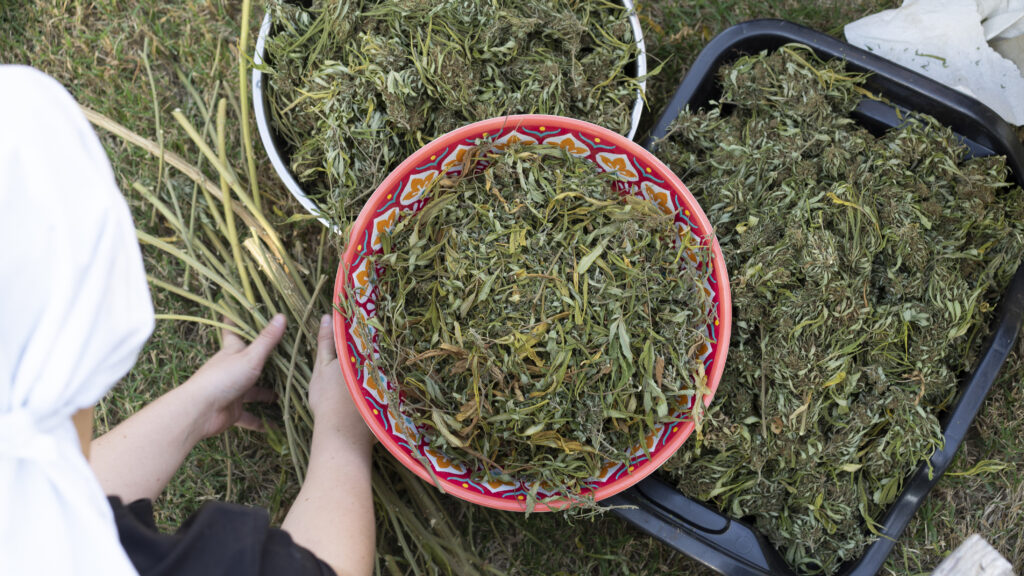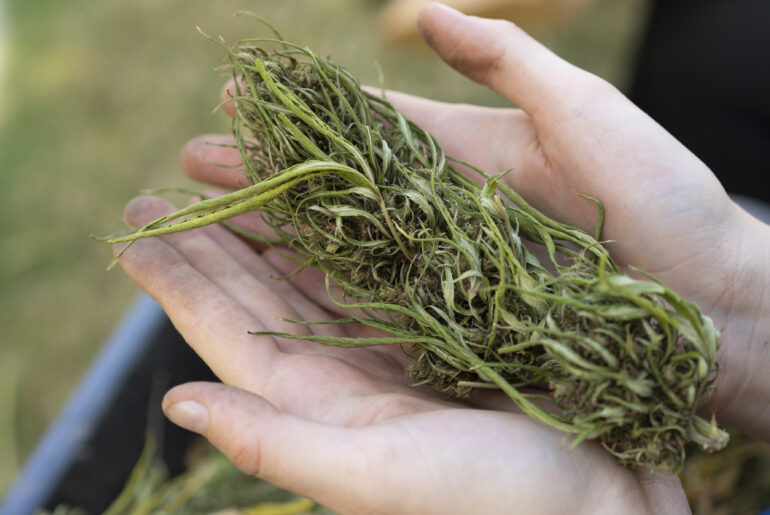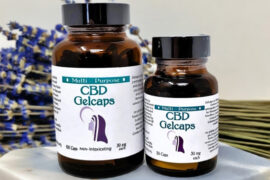Not Sure Where to Start?
Discover what works best for your body and lifestyle—whether you’re exploring for the first time or coming back for your favorites, we’ve got you covered.
Rick Simpson Oil is a post-millennial name for an oil that is so old it is referenced in the Bible (canna-bosm) and has been found in the tombs of Egyptian pharaohs.
According to scholars, a recipe for Jesus’ holy anointing oil in Exodus 30: 22-25 contains cannabis:
“Take the following fine spices: 500 shekels of liquid myrrh, half as much of fragrant cinnamon, 250 shekels of q’aneh-bosm, 500 shekels of cassia– all according to the sanctuary shekel– and a hind of olive oil. Make these into a sacred anointing oil, a fragrant blend, the work of a perfumer. It will be the sacred anointing oil.”
In that Bible passage, there’s a mysterious herb mentioned, q’aneh-bosm, that is now commonly identified as “keneh-bosm,” and most historians now believe that this herb was in fact, cannabis.
So, to be clear, Rick Simpson didn’t invent pure plant cannabis oil. Pure plant cannabis oil is older than the hills.
So Why Do We Call It RSO?
According to Leafly (2016):
In 2003, Rick Simpson created a cannabis oil after three suspicious bumps on his arm turned out to be basal cell carcinoma, a form of skin cancer. Simpson had used cannabis to treat medical issues in the past, so he made a cannabis oil to treat his skin cancer topically, applying it to a bandage and covering the cancerous spots.
Within days, the cancerous growths disappeared. Although his physician refused to acknowledge cannabis as a treatment alternative, Simpson became a true believer in the medicinal powers of cannabis and spread the word of his cannabis oil, later called RSO after him.
Pure Plant Oil, as ancient as dirt, also known as ‘full extract cannabis oil’, also known as Rick Simpson Oil (RSO) is an exceptionally potent type of cannabis oil that uses alcohol as its solvent. Rick Simpson, an activist for the plant, put himself at risk by going public on social media and in other ways to teach people how to make it at home with simple equipment and readily available ingredients. As a result of Rick’s efforts, the pure plant oil is incredibly popular with people seeking the most potent curative powers of the plant. And as a result of Mr. Simpson’s activism, most of the world now refers to pure plant oil as RSO (Rick Simpson Oil).

What is Pure Plant Cannabis Oil?
Cannabis oil is an extract of the cannabis plant that is rich in the various chemical constituents that give cannabis its psychoactivity and medicinal benefits.
As of 2014, over 545 different constituent compounds have been identified in the cannabis plant, most of which can be broken down into the following three categories:
- Terpenes or terpenoids – There are approximately 140 of these compounds present in cannabis. According to ongoing research, many of these terpenes/terpenoids contribute extensive medicinal benefits to the final cannabis product.
- Phytocannabinoids – Of the approximately 104 phytocannabinoids that have been identified, the two most widely researched and used are tetrahydrocannabinol (THC) and cannabidiol (CBD). Although THC and CBD are closely related and share many of the same medicinal properties, it should be noted that THC is the phytocannabinoid that causes intoxication (or the high associated with marijuana).
- Flavonoids or bioflavonoids – So far, scientists have identified about 20 flavonoids in cannabis. Because they have not been as extensively studied and analyzed as phytocannabinoids and terpenoids, these constituent compounds are shrouded in a little mystery. However, it appears that they have anti-inflammatory and fungicidal properties, making them pharmacologically active as well.
But how do you get cannabis oil from the raw plant material (also referred to as dried cannabis)? Well, there are a number of different ways to perform cannabis extraction, each with their respective pros and cons. However, they all require the use of a solvent to extract the chemical constituents in the unprocessed cannabis oil.
Some varieties of cannabis oil go through additional steps, like short-path distillation, to result in a “purer” final product.
What Is Rick Simpson Oil (RSO)?
Rick Simpson Oil is pure plant oil is canna-bosm oil is full extract cannabis oil. They are all one and the same. People began calling it Rick Simpson Oil because of his activism, because he was brave enough to come out in a time when the plant was not so accepted and he was persecuted for doing so. Even Rick doesn’t call his own products Rick Simpson Oil. His product line is Phoenix Tears. He had to move out of the country to keep from being persecuted.
Pure plant oil (Rick Simpson Oil) has exceptionally high levels of THC, but that is based on making it from plant that is high in THC. If produced properly, its final concentration of THC can range anywhere from 60 to 90%! We have made pure plant oil from plants that are high in CBD and then the THC topped at 30%. Pure plant oil that is made from CBD-rich plants is generally not referred to as Rick Simpson Oil. Rick Simpson oil is generally referring to high THC cannabis oil.
Rick Simpson showed the world an ancient, easy and inexpensive method for producing high-grade cannabis oil. Simpson claimed that his pure plant oil helped treat a number of his medical conditions, although not all of these claims have been validated by researchers or the results recreated in large-scale, double-blind studies. However, there is still a great deal of evidence that THC has potent medicinal qualities as evidenced by extensive and ongoing research.
Ultimately, RSO is particularly appealing for cannabis enthusiasts since it’s easy to make and does not require fancy equipment or a lot of money. In fact, this do-it-yourself (DIY) method of cannabis oil production can be done almost entirely with materials and supplies gathered from regular pharmacies and stores while using food-grade solvents.

Not Sure Where to Start?
Discover what works best for your body and lifestyle—whether you’re exploring for the first time or coming back for your favorites, we’ve got you covered.
What Solvent Is Used to Make Rick Simpson Oil (RSO)?
Remember, each type of cannabis oil extraction requires the use of a solvent. The chemical properties of this solvent “pull out” the chemical constituents in order to create a final cannabis oil product.
So what kind of solvent is used to make Rick Simpson Oil (RSO)? The answer is simple: alcohol. However, this is a fairly broad category of chemical compounds, so let’s narrow it down to the following two types:
- Isopropyl alcohol – In order to be the most effective, the alcohol solvent should have a concentration of 99% for maximum efficacy.
- Ethanol – Also known as grain alcohol, this can also be used for RSO production and is the form of alcohol that is safe to ingest. (The Sister’s use 150 proof grain alcohol)
Most people use grain alcohol as a safer choice and only use isopropyl alcohol for when they can’t get grain alcohol.
Indica or Sativa – Which Is Better for Making RSO?
Although there is significant debate amongst producers, most agree that the ideal starting plants are high-THC varieties of Cannabis indica (sometimes known as Cannabis sativa indica). Additionally, Simpson himself has stated that sedative Indica varieties or Indica dominant Sativa hybrids (with no more than 10% Sativa) are the optimal option.
Furthermore, strains that have low levels of CBD are also preferred, as recent research suggests that CBD actually counters some of the effects of THC. Consequently, if a producer wishes to recreate the famous potency of Rick Simpson Oil (RSO), it’s best that they stick to cannabis varieties that are:
- High THC
- Low CBD
Finally, Simpson has also suggested that the THC content of the sedative Indica strain should be at least 20% THC and that the plants themselves be females. By sticking to these criteria, you will ensure that the final oil product will have the telltale potency that has become synonymous with high-quality pure plant oil (RSO).

What Is the Dosage Amount for Rick Simpson Oil (RSO)?
RSO is so beloved because it can be made easily and inexpensively at home. However, this DIY approach means that it’s virtually impossible to create a final product that has standardized dosing and consistent levels of THC. Ultimately, you need the extensive equipment and technical know-how of a full extraction lab to create consumer-grade products, and then, there’s the fact that every consumer is a health ecosystem with many variables. People have to learn, with cannabis, to find their own dosage.
However, the general consensus is that you can consume the following amounts of high-THC pure plant oil as a starting dosage and adjust from there:
- Total cannabis novice – size of ¼ a grain of rice.
- Occasional user – size of ⅓ a grain of rice.
- Mild to moderate user – size up to ½ a grain of rice.
- Heavy user – size between ½ to 1 grain of rice.
These are by no means standardized dosage amounts and should be considered more as general guidelines. Furthermore, if in doubt, adhere to the old maxim: start low and go slow. Don’t overdo it! While it’s true that cannabis products, even potent ones like pure plant oil, are not very dangerous, overconsumption can be extremely unpleasant and may require medical attention.
What Are the Benefits of Pure Plant Oil?
- It’s easy to make and does not require a highly trained or experienced operator. In fact, a novice in cannabis extraction could potentially make a potent first batch.
- The production of RSO does not require expensive or complex machinery.
- RSO can be made at home with readily available ingredients.
- It has an exceptionally high percentage of THC (60 to 90%), making it one of the more potent forms of cannabis oil.
- Many users have reported that it has substantial health and medicinal benefits due to its high percentage of THC.
- It can be ingested both orally or applied topically (as an ointment, balm, or salve).
What are the Side Effects of Pure Plant Oil?
Remember that pure plant oil is generally extremely rich in THC. Consequently, its consumption will deliver a high dose of this psychoactive phytocannabinoid, meaning that the euphoria and high could be considerable. For some users, especially experienced ones, this is precisely why they love RSO so much! On the other hand, users who do not have a high tolerance for cannabis can find the experience of taking too much RSO/THC extremely distressing.
In fact, excessive consumption of pure plant oil high in THC can lead to a number of negative side effects. In cases of acute consumption, these include:
- Severe anxiety or paranoia
- General impairment
- Slurred speech
- Slowed down reaction times
- Poor impulse control
- Inability to concentrate or think clearly
- Eyes that are irritated and/or red
- Sluggishness and/or fatigue
Additionally, there are more serious side effects like:
- Increase in heart rate (tachycardia)
- Temporary psychosis or hallucinations
- Problems with physical movement or coordination (driving while intoxicated from RSO/THC is dangerous and illegal)
In most users, even those who are experienced in consuming cannabis, RSO/THC can also be amnestic. This means that it may cause some memory loss as well as the inability to properly form new memories in a user who is intoxicated.
Interestingly enough, CBD can be used to reverse some of the negative side effects of excessive RSO/THC consumption. Although CBD and THC both interact with the same cannabinoid receptors (known as CB1 and CB2 receptors), they have different mechanisms of action.

Is Pure Plant Oil of the Cannabis Plant (RSO) Safe?
Yes, absolutely! Remember that the primary active ingredient in pure plant oil is THC. Consequently, ongoing and long-term cannabis research has concluded that THC has an incredibly wide safety margin. In psychopharmacology, the term LD50 refers to the lethal dose of a compound for 50% of subjects. In terms of cannabis research, multiple studies have concluded that the median LD50 of THC is:
- About 800 milligrams (0.8 grams) per 1 kilogram in rats
- About 3000 milligrams (3 grams) per 1 kilogram for dogs
- Up to 9000 milligrams (9 grams) per 1 kilogram in non-human primates (monkeys)
If we use these figures to extrapolate for human subjects, the LD50 for a human weighing 64 kilograms (or 141.1 pounds) would be 8.45 kilograms (or 18.6 pounds). That is an ungodly amount of THC! Realistically, a person could not ingest enough cannabis to reach that amount, even if it’s in the form of pure plant oil and has an exceptionally high percentage of THC.
Furthermore, high-THC pure plant oil will not cause an overdose like other, more dangerous drugs. This is because THC does not affect the respiratory system. The breathing process is controlled by a region of our brain known as the brainstem, and there is a very low density of cannabinoid-1 (CB1) receptors in the brainstem. As a result, THC does not impair breathing.
In fact, THC is usually associated with mortality in cases where an accident has occurred (driving while intoxicated, for example) or if the decedent had multiple drugs in their system. Also known as combined drug intoxication (CDI) or multiple drug intake (MDI), this means that the THC was not the direct or primary cause of death.
However, a RSO/THC overdose can still be a frightening experience, especially considering that it can cause massive paranoia, auditory hallucinations, and tachycardia. Consequently, going to the hospital is highly advised if such a situation occurs. While it’s true that these adverse effects will eventually subside after a few hours, for some people it’s simply too intense to bear without medical intervention. (In these days of Covid, we recommend, actually, that you first take a heavy dose of CBD to counteract the THC before considering a hospital visit. CBD will bring someone out of a panic attack or over-drugged fog.)
Ultimately, Rick Simpson Oil (pure plant oil that is very high in THC) remains an exceptionally popular form of cannabis oil. Many cannabis enthusiasts swear by it, although it is generally not advised for users who do not regularly use cannabis products.
In fact, there is even a sizable contingent of its supporters who advise against using it recreationally for anyone who does not have high cannabis tolerance. This makes sense because, at the end of the day, its THC content is just too high for a cannabis novice!

Are There Other Forms of Cannabis Extraction with Alcohol?
Pure plant cannabis oil maintains its popularity due to the ease by which a newcomer can create a potent batch. Virtually anyone can create a final product that will have high levels of THC, even if it’s their first time doing any sort of cannabis extraction.
However, for many consumers, the raw and unprocessed nature of home-made oil (RSO) is actually a drawback. Furthermore, this DIY approach results in a final product that:
- Has a bitter, unpleasant taste due to high levels of chlorophyll.
- Lacks effective quality control.
- Has uneven dosage amounts.
- Does not have specific phytocannabinoids/terpenes that have been targeted.
Essentially, RSO production is like a brute-force attack. It strips the cannabis plant of everything but the cellulose fibers, resulting in a final product that is potent but not purified or distilled. The home-made pure plant cannabis oil has an unappealing color and can have a sludgy consistency due to the fact that it’s raw and unprocessed. Some cannabis enthusiasts prefer this form, but it’s absolutely true that not every consumer will like that!
As a result, there are methods of cannabis extraction that use supercooled or cryogenic ethanol to more effectively extract the most desirable parts of the cannabis plant. In essence, the ultra-low temperature of the ethanol is significant in this extraction process. By cooling the ethanol to well below 0 degrees Celsius, the polarity of the ethanol is manipulated so that it acts as a nonpolar solvent and only attaches to the desirable phytocannabinoids and terpenes.
Furthermore, this form of ethanol extraction is both exceptionally efficient and safe. It’s also important to note that using these more precise methods means that the final product can have its THC or CBD levels controlled more exactly. For example, not every consumer wants a final product that is chock-full of THC, so using a more sophisticated extraction method allows the producer to create a cannabis extract or oil that will have more manageable amounts of THC.
The Sisters learned everything we know about making pure plant oil from youtube. And Rick Simpson was one of the first of the modern era to come out of the closet with this medicine.
We all owe him a debt of gratitude for pushing the envelope on the laws during a time when it got him persecuted. We all know a lot more about the plant because of his work.
If you decide to make or use high-THC cannabis oil, have some CBD handy. . . now is not a good time to be running to the hospital for over-indulging in psychotropics.
Not Sure Where to Start?
Discover what works best for your body and lifestyle—whether you’re exploring for the first time or coming back for your favorites, we’ve got you covered.







Comments are closed.